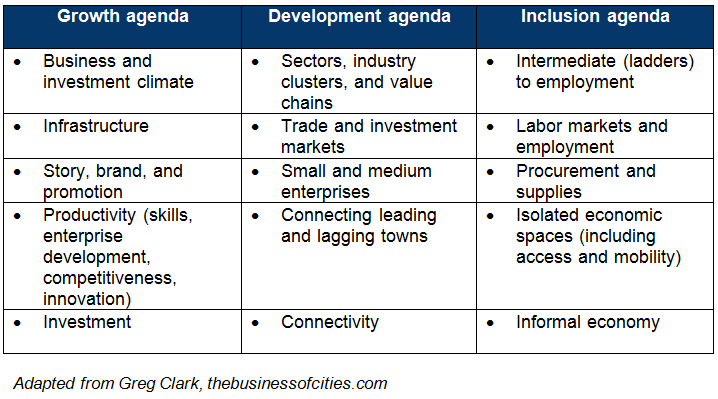Evidence from cities and regions around the world suggests that successful economic development works best through a “whole of society” approach. This implies building a capable state, efficient markets, and an involved civil society through city growth coalitions in order to execute collective action.
How does a partnering approach work best in practice? Based on my experience as a former Cape Town city manager as well as a partnering practitioner for the past 15 years, here are 12 tips for effective partnering strategies for inclusive city growth:
1. Get city stakeholders to agree on a shared vision and common agenda for joint action for growth and inclusion. This is easier said than done, particularly in cities that have emerged from conflict, resulting in contested city and societal narratives. An authentic city story, as opposed to a traditional marketing spiel, needs to reflect diverse needs and narratives.
2. Understand the practice of economic development in terms of the performance of the metropolitan economic system. This means focusing on the health of relationships between the key public, private and civic institutions, rather than delivering disparate economic project.
3. Do not view economic growth and inclusion as mutually exclusive. Seek agreement on a balanced economic toolkit, with different but complementary tools to promote growth, development, and inclusion:

4. Make use of different combinations of partnering solutions, e.g.:
- Inter-disciplinary partnering across departmental silos
- Inter-governmental partnering, connecting tiers of government and public entities, to aggregate and blend mandates, powers, functions, and budgets
- Cross-boundary partnering, creating functional spatial alignment, connecting ”leading” and “lagging” areas and regions
- Cross-sector partnering between public, private, non-profit, philanthropic, labor, civil society, knowledge institutions
5. Don’t try and address all issues through a single partnership structure. It is more effective to focus on delivering issue-based partnering solutions and area-based partnering solutions through discrete partnering initiatives, whether focused on water infrastructure or university-firm R&D collaboration.
6. Help your partners deliver on their mandates in a collaborative manner. This means fostering collaborative leadership and addressing non-collaborative institutional cultures and behaviors.
7. Map the roles and responsibilities of key institutions in the metropolitan economic development system, in order to minimize competing and overlapping mandates and activities.
8. Agree on common measures of economic performance in order to improve mutual accountability among partners.
9. Do not simply promote your own institution. Rather, promote the city-region as a whole, and the successes of your partners.
10. Provide a “translation” service. The public, private, and civic sectors tend to speak in different terms with different mindsets and often talk past each other.
11. Create safe spaces where partners can speak openly, as opposed to forums where participants simply defend sectoral interests. Productive, safe spaces are those in which participants feel compelled to “take of their jackets at the door.”
12. Get the right people in the room, i.e., collaborative leaders who can, in the words of University of Cape Town Graduate School of Business Professor Ralph Hamann, “create a compelling vision that motivates commitment, foster joint ownership and responsibility, translate divergent perspectives, understand and communicate the big picture, embrace diversity and difference, and see conflict as an opportunity for innovation.”
Adapted from a presentation to the
Municipal Demarcation Board
Conference on Demarcation and Spatial Transformation, Gauteng, South Africa, 23-24 June 2016. A city economic partnering methodology is being incorporated into the National Treasury City Support Programme, working with the eight metropolitan areas in South Africa.
Andrew Boraine is a former Cape Town City Manager. He was the founding chairperson of the
South African Cities Network
in 2002, and CEO of the
Cape Town Partnership
from 2003-13. He is currently the CEO of the
Western Cape Economic Development Partnership
(EDP), established in 2012 to improve the performance of the Cape Town and Western Cape regional economic development system through partnering solutions.
Contact Andrew at
[email protected]


Commentary
12 partnering tips for inclusive city growth
July 11, 2016